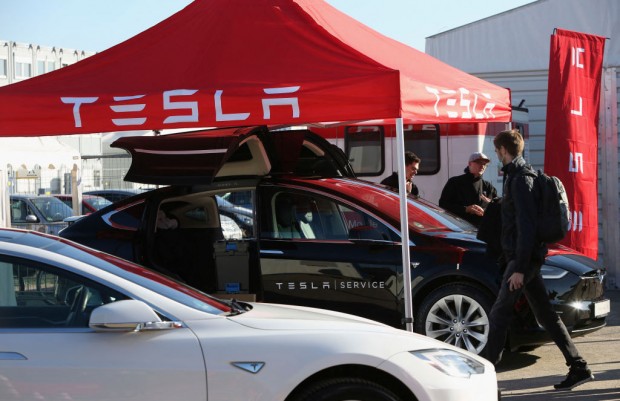Visitors look at Tesla cars during the "Gigafest" open house county fair-style event, in which local residents were invited to visit the Tesla automobile company's Gigabit factory construction site in Gruenheide, near Berlin on October 9, 2021.
(Photo : ADAM BERRY/AFP via Getty Images)
2021 was a huge year for electrification in the auto industry, with electric vehicles grabbing a much more significant share in the car market globally. Sales of electric cars more than doubled last year despite a supply chain crisis brought upon by the COVID-19 pandemic and a computer chip shortage.
According to data from UK-based research company LMC Automotive, a total of 4.5 million battery electric vehicles were sold worldwide last year, a big jump from the 2.1 million EVs sold in 2020. Electric vehicles accounted for 6.3 percent of global car sales in 2021, three times their market share in 2019, the year before the pandemic started.
EV sales may have been on the rise last year, but the same cannot be said of overall passenger vehicles. Car manufacturers sold just 72 million units worldwide in 2021, with the semiconductor shortage hampering production globally, even forcing many carmakers to close their factories temporarily.
Chip shortage a blessing in disguise for electric vehicles
Al Bedwell, the director of global powertrain at LMC Automotive, explained to CNN Business that the semiconductor shortage contributed to the surge in sales of electric vehicles. Bedwell said that the low-emission electric vehicles got prioritized in areas such as Europe and China because they were the ones consumers wanted to buy, and carmakers also needed to sell them to meet their regulatory targets.
Governments are forcing the auto industry to shift its production towards electric cars. The European Union wants automakers to slash their carbon emissions soon, with fines awaiting them in the next few years if they fail to do so. Carmakers will need to cut average yearly emissions of their lineups by 15 percent by 2025 and up to 37.5 percent by the year 2030 compared to their 2021 levels.
Time is running out for vehicles with internal combustion engines, with the European Union wanting to impose a total ban on sales of those cars from 2035. Aside from exerting pressure on automakers, governments have also dangled enticing subsidies and tax breaks to consumers to convince them to go electric.
Related Article: Mini Recharged Provides Owners of Classic Mini Option To Turn Cars Into Electric Vehicles
US market the next target for electric carmakers
The German government extended its "innovation premium" program for electric car buyers until the year 2025, with a €9,000 ($10,000) bonus handed out to those who will purchase new electric vehicles worth up to €40,000 ($45,000). German customers took full advantage of this program, with sales of electric vehicles in the country more than doubling in 2021.
While sales of electric vehicles in Europe and China went up last year, the EV market in the United States still lags. Electrics accounted for just 3 percent of sales in the US, well behind the market share of EVs in Europe (10 percent) and China (12 percent). That is about to change, though, with American automakers investing tens of billions of dollars in the electric vehicle race.
READ MORE ON AWN:
Man Uses 4.3 Liters Lexus V8 Engine, Turbocharger in Toyota Subaru WRX STI Showing Amazing Results!
Maserati To Race in Formula E for 2023 Season; Provides Major Boost to All-electric Series
See Now: OnePlus 6: How Different Will It Be From OnePlus 5?




























